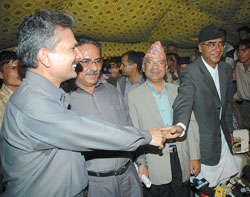|
|
The Maoists felt left out and demanded the dissolution of parliament on 16 June, but this has brought flak from the seven party alliance.
Leaders of the SPA are getting increasingly frustrated with Maoist stubbornness and are saying so openly. The level of mistrust and scepticism is growing and the parties blame this on the arrogance of Maoist cadres who don't seem to know how to make the transition from armed struggle to peaceful politics.
While senior rebel leaders are going around the capital constantly criticising the parties and underlining what they say was their crucial role in the movement, local commanders in the villages are intimidating party workers, especially of the NC and UML.
"We are working really hard towards building a positive political environment and the Maoists should reciprocate," says Sushil Koirala of the NC. With their belligerent talk, the Maoists have been violating the 25-code of conduct agreed in Gokarna last month to tone down the rhetoric, party leaders say.
The Maoists, meanwhile, are on a public relations offensive meeting party leaders and Kathmandu-based diplomats.
"We hope that the Maoists will live up to their commitments, which we reminded their leaders of again recently," explained Koirala, who met Pushpa Kamal Dahal and Baburam Bhattarai on Tuesday in the capital.
The Maoists have not returned property they seized and have refused to allow party workers back to their villages. "In several places, our cadres have been constantly bullied and threatened by local Maoist cadre who are also not ready to return the property looted in the past even of poor people," said Pradeep Nepal of the UML, who has been sharply critical of Maoist behaviour.
But citizens groups claim that the situation is not so dire as to o jeopardise the understanding between the parties and the Maoists.
"There is no misunderstanding at all but merely an internal competition between the eight parties," said political analyst Krishna Khanal.
Both the parties and Maoists are disseminating their own propaganda and naturally there are differences in opinions.
In addition, the party cadres are not really going to the people in the remote villages so it is a false claim that the Maoists are posing a threat to them.
Maoist leaders say the peace process is moving too slowly and the government is dragging its feet on the setting up of an interim government but the parties say the pace is more than expected. At a time when both sides are supposed to focus on the key issue of making a clear road map and finalising the modalities of a constituent assembly election, there has been little homework (see box).
Women's groups are enraged that there are no women in the committee made up to draft an interim constitution. Party leaders, even from within the cabinet, have started to criticise both the government and the Maoists for rushing to dissolve parliament and go for the interim constitution.
South African model
So far, the South African model for a constituent assembly seems to fit the Nepali situation best. Seats in this type of assembly are elected by a system of proportional representation and allocated on the basis of the percentage of votes that each party gets. Each party appearing on the ballot will submit a rank-ordered list of candidates.
The assembly will then replace the parliament and have the dual role of framing a new constitution and governing the country until a government is formed.
"We have to decide on three crucial things: methods of representation, electoral areas to be determined and methods of election," explains Bhimarjun Acharya, a constitutional lawyer working on proposals for the best model of a constituent assembly.
"If we go by general parliamentary election style, there will definitely be a tussle for power," explains Acharya.
So far, the parties and the Maoists are reported to be positive about the South African model and indigenous groups are also said to be onboard. "There should be proportional representation by 50 percent women candidates and 38 percent adivasis without any conditions," says Malla K Sundar, president of the Newar National Organisation.
But people we talked to caution it shouldn't be done in a hurry like the interim constitution. South Africa tookfive years to pass its new constitution.



